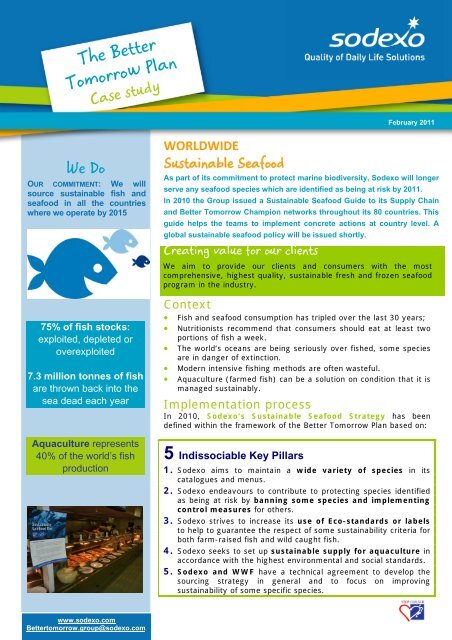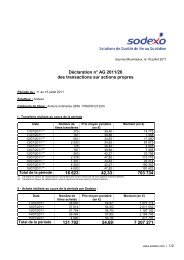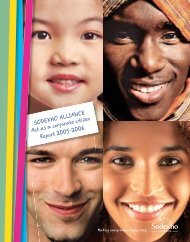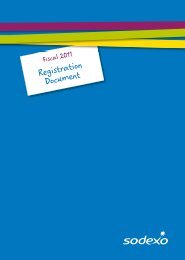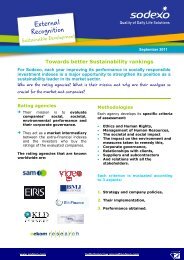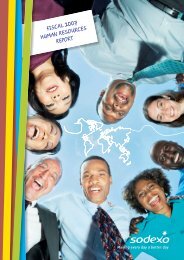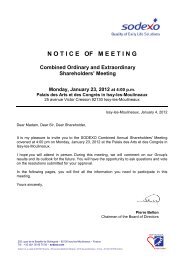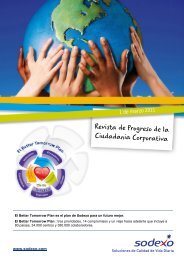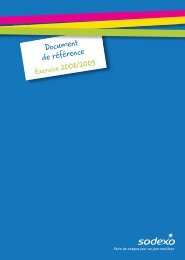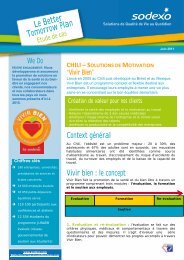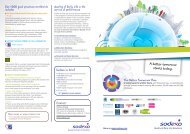The Better Tomorrow Plan
The Better Tomorrow Plan
The Better Tomorrow Plan
Create successful ePaper yourself
Turn your PDF publications into a flip-book with our unique Google optimized e-Paper software.
<strong>The</strong> <strong>Better</strong><br />
<strong>Tomorrow</strong> <strong>Plan</strong><br />
We Do<br />
Case study<br />
OUR COMMITMENT: We will<br />
source sustainable fish and<br />
seafood in all the countries<br />
where we operate by 2015<br />
75% of fish stocks:<br />
exploited, depleted or<br />
overexploited<br />
7.3 million tonnes of fish<br />
are thrown back into the<br />
sea dead each year<br />
Aquaculture represents<br />
40% of the world’s fish<br />
production<br />
www.sodexo.com<br />
<strong>Better</strong>tomorrow.group@sodexo.com<br />
WORLDWIDE<br />
Sustainable Seafood<br />
As part of its commitment to protect marine biodiversity, Sodexo will longer<br />
serve any seafood species which are identified as being at risk by 2011.<br />
In 2010 the Group issued a Sustainable Seafood Guide to its Supply Chain<br />
and <strong>Better</strong> <strong>Tomorrow</strong> Champion networks throughout its 80 countries. This<br />
guide helps the teams to implement concrete actions at country level. A<br />
global sustainable seafood policy will be issued shortly.<br />
Creating value for our clients<br />
February 2011<br />
We aim to provide our clients and consumers with the most<br />
comprehensive, highest quality, sustainable fresh and frozen seafood<br />
program in the industry.<br />
Context<br />
• Fish and seafood consumption has tripled over the last 30 years;<br />
• Nutritionists recommend that consumers should eat at least two<br />
portions of fish a week.<br />
• <strong>The</strong> world’s oceans are being seriously over fished, some species<br />
are in danger of extinction.<br />
• Modern intensive fishing methods are often wasteful.<br />
• Aquaculture (farmed fish) can be a solution on condition that it is<br />
managed sustainably.<br />
Implementation process<br />
In 2010, Sodexo’s Sustainable Seafood Strategy has been<br />
defined within the framework of the <strong>Better</strong> <strong>Tomorrow</strong> <strong>Plan</strong> based on:<br />
5 Indissociable Key Pillars<br />
1. Sodexo aims to maintain a wide variety of species in its<br />
catalogues and menus.<br />
2. Sodexo endeavours to contribute to protecting species identified<br />
as being at risk by banning some species and implementing<br />
control measures for others.<br />
3. Sodexo strives to increase its use of Eco-standards or labels<br />
to help to guarantee the respect of some sustainability criteria for<br />
both farm-raised fish and wild caught fish.<br />
4. Sodexo seeks to set up sustainable supply for aquaculture in<br />
accordance with the highest environmental and social standards.<br />
5. Sodexo and WWF have a technical agreement to develop the<br />
sourcing strategy in general and to focus on improving<br />
sustainability of some specific species.
<strong>The</strong> Netherlands:<br />
• Sodexo is the 1 st<br />
foodservice company to<br />
obtain MSC eco-label and<br />
certification<br />
•<br />
UK & Ireland:<br />
• Sodexo is the leading<br />
contract caterer for MSCcertified<br />
sites<br />
• with 1,000 MSC-certified<br />
sites as of end of 2010<br />
Sodexo purchases some<br />
800 metric tons of<br />
seafood every year, of<br />
which some 150 metric<br />
tons are MSC certified.<br />
More information<br />
Lesley SANDER<br />
lesley.sander@sodexo.com<br />
Moving forward<br />
• <strong>The</strong> list of at risk species has been communicated internally and<br />
also to suppliers.<br />
• Based on a large number of external references, Sodexo has<br />
established a Purchasing Guide for the supply of Fish & Seafood<br />
respecting various sustainability criteria made as a tool to make the<br />
best choice for our future assortment, Fresh, Frozen or Canned.<br />
• We are in the process of finalising an agreement with the Marine<br />
Stewardship Council (MSC)* which will allow us to certify either our<br />
sourcing at country level for communication to clients or our Supply<br />
Chain to site level for communication to consumers.<br />
• In Europe, Sodexo has selected sustainable supply for two farmraised<br />
fish in 2010 and their implementation is scheduled from 2011<br />
• Sodexo in North America has just launched its sustainable seafood<br />
initiative, “Your <strong>Better</strong> Choice in Seafood”, which involves a<br />
commitment to its contracted seafood being 100% certified by 2015.<br />
*MSC is the leading eco-label and fishery certification program which mission is<br />
to contribute to improvements in marine conservation, by recognizing and<br />
rewarding sustainable fishing practices, influencing the choices people make<br />
when buying seafood, and working with its partners to transform the seafood<br />
market to a sustainable basis.<br />
Resources<br />
As part of the <strong>Better</strong> <strong>Tomorrow</strong> <strong>Plan</strong> implementation process, a Subject<br />
Matter Leader for Sustainable Supply Chain Initiatives has been<br />
appointed to pilot the “Sustainable Fish and Seafood” commitment. A<br />
working group of relevant experts has been created in order to define a<br />
clear strategy on this commitment.<br />
Certified Sustainable Seafood at country level<br />
• <strong>The</strong> Netherlands: Sodexo was the first foodservice company to<br />
obtain the MSC eco-label and certification in April 2009.<br />
• United Kingdom : Sodexo is the leading contract caterer for MSCcertified<br />
sites and plans to roll this program out further across the<br />
business. Sodexo was the first foodservice company to achieve MSC<br />
certification across all of its Education sites in 2009.<br />
Many other countries have already started to purchase fish and<br />
seafood from certified sustainable sources e.g. Belgium (15% of<br />
the fish and seafood purchased), Canada (34%), Sweden (24%) or the<br />
United States (11%).<br />
Global collaboration with MSC<br />
MSC and Sodexo have expressed a mutual interest to<br />
collaborate and work together to trigger wider<br />
demand for sustainable seafood in the<br />
foodservice sector. Collaboration with MSC will<br />
enable to work with its partners on an “end-to-end”<br />
basis, including fisheries, suppliers to foodservice<br />
providers, restaurant operators and their customers.<br />
Moreover, Sodexo will provide MSC with the<br />
opportunity to educate a broad consumer<br />
audience about sustainable seafood.<br />
Finally, focusing on this sector and developing tailored, foodservice<br />
specific plans will enable Sodexo to motivate consumers towards<br />
making sustainable choices.


